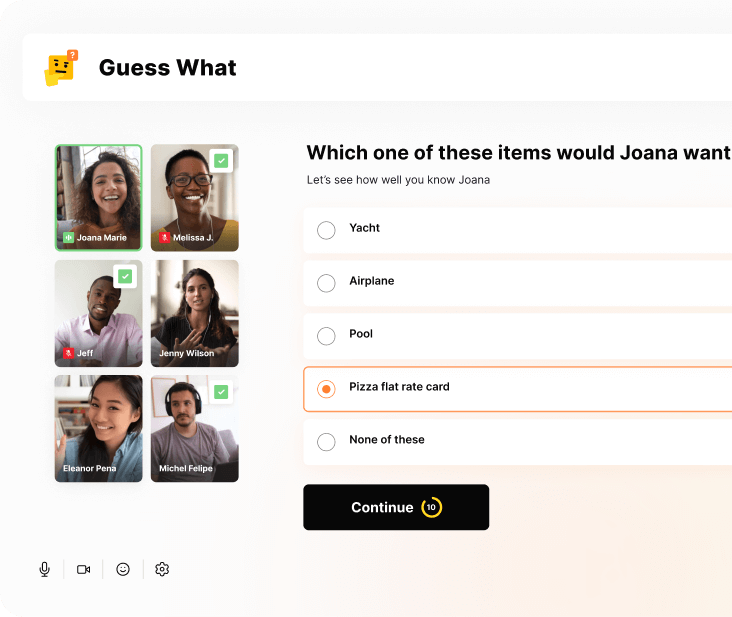Back to Blog
The 5 drivers of employee retention in the remote workforce
Since the Great Resignation began, organizations have seen record-high turnover rates and resignations. 47.8 million US workers quit their jobs in 2021—an average of nearly 4 million each month—leaving many employers scrambling to find replacements.
Consequently, the spotlight has turned to employee retention—particularly remote workforce retention. With 58% of the American workforce working remotely at least once per week, it's more important than ever for employers to focus on strategies that keep their remote employees happy and engaged.
Need a quick start? Check out some of the best employee engagement platforms, engagement apps, and other digital employee engagement solutions.
What are the key drivers of remote employee retention?
Enhancing the working environment can minimize the likelihood of valuable employees leaving the company. An in-depth analysis of employee retention determined nine main factors influencing retention, ranging from compensation to job security.
Discover how these drivers of employee retention impact turnover, engagement, satisfaction, and other key employee engagement statistics.
Employee retention statistics reveal that geographically-dispersed team members are more likely to feel isolated and left out than those who work in an office.
Create a strategy to keep your remote team happy and productive by understanding these key drivers of remote employee retention:
- Work environment
- Reward and recognition
- Training and development
- Promotion and opportunity to grow
- Leadership
Share fun facts and bond with a team quiz
Have your participants choose from a list of questions they’d like their coworkers to answer about them, before watching as they guess the right answer.
01. Yes
share-fun-facts-and-bond-with-a-team-quiz

Run a guided recognition activity
Have your participants choose from a list of questions they’d like their coworkers to answer about them, before watching as they guess the right answer.
01. Yes
run-a-guided-recognition-activity

Organize a virtual cooking class
Hire a professional chef to help your team cook a delicious lunch or dinner. May be difficult for co-workers with families. To find providers and get tips, read our blog about virtual cooking classes.
02. No
organize-a-virtual-cooking-class

Hire a stand-up comedian
Have your participants choose from a list of questions they’d like their coworkers to answer about them, before watching as they guess the right answer.
02. No
hire-a-stand-up-comedian

No items found
No items found
Table of contents
Since the Great Resignation began, organizations have seen record-high turnover rates and resignations. 47.8 million US workers quit their jobs in 2021—an average of nearly 4 million each month—leaving many employers scrambling to find replacements.
Consequently, the spotlight has turned to employee retention—particularly remote workforce retention. With 58% of the American workforce working remotely at least once per week, it's more important than ever for employers to focus on strategies that keep their remote employees happy and engaged.
Need a quick start? Check out some of the best employee engagement platforms, engagement apps, and other digital employee engagement solutions.
What are the key drivers of remote employee retention?
Enhancing the working environment can minimize the likelihood of valuable employees leaving the company. An in-depth analysis of employee retention determined nine main factors influencing retention, ranging from compensation to job security.
Discover how these drivers of employee retention impact turnover, engagement, satisfaction, and other key employee engagement statistics.
Employee retention statistics reveal that geographically-dispersed team members are more likely to feel isolated and left out than those who work in an office.
Create a strategy to keep your remote team happy and productive by understanding these key drivers of remote employee retention:
- Work environment
- Reward and recognition
- Training and development
- Promotion and opportunity to grow
- Leadership
Increase employee retention in your remote workforce with these tips
There are several popular models and theories on increasing employee retention, but not all apply to the remote workforce. Rethink your employee retention strategy to include both on-site and remote workers.
Success requires paying special attention to the challenges of remote teams and taking steps to overcome them.
Here's how you can address the most critical factors of remote workforce employee retention.
1. Encourage a positive work environment
A positive work environment takes more than just happy hours and office pranks (though those can help too). Focusing on company culture and employee engagement will set the tone for your team and make everyone feel like they belong.
When remote employees feel connected, appreciated, and supported, they're more likely to stay with the company.
Try these solutions:
- Conduct a survey to get a pulse on your remote team's current state. Employee engagement surveys can help you identify areas of improvement and take action to address them.
- Try Gomada to engage your team and strengthen relationships with remote team building activities. These fun, interactive challenges encourage coworkers to get to know each other and build trust.
- Making the general working conditions as attractive as possible. This may include offering the option of remote work, offering private remote health insurance, providing the necessary equipment, or encouraging team members to take their PTO.
2. Give your team the rewards and recognition they deserve
If remote employees aren't getting the recognition they deserve, they can feel isolated and disengaged. According to a Gallup study, unacknowledged employees are twice as likely to say they'll leave in the next year.
In a remote workforce, recognition is critical since there are no face-to-face interactions to recognize achievements.
Try these solutions:
Regularly acknowledge success, and provide feedback to your team. Encourage peer recognition as well. Research shows online recognition and appreciation tools contribute significantly to remote work success.
3. Offer training and development opportunities
Remote workers may be autonomous but still want to feel like their employers are invested in them. 76% of employees say continuous training would encourage them to stay with an organization longer.
Learning and development opportunities show employees that you invest in their growth, making them feel valued and appreciated.
Try these solutions:
- Create a development plan for each employee that outlines their goals and how to achieve them. Gamification using game-based learning platforms can make learning fun and engaging, especially for remote employees.
4. Invest in your employees' growth and promote from within
Encouraging your employees to grow their careers within the company is a great retention strategy. In 2021, 63% of workers who quit their jobs listed a lack of opportunities for advancement as a major reason for leaving.
When you promote from within, you not only retain top talent but also show your employees that there are opportunities for advancement.
Try these solutions:
- Be transparent about opportunities for growth and advancement within the company. Performance reviews can help you identify top performers and provide mentorship to help them reach the next level.
5. Ensure leadership is accessible and supportive
The manager's role in employee engagement is crucial, especially in a remote workforce. Managers must be accessible and supportive to ensure their team feels connected and valued.
If employees don't feel heard at work, they're less likely to maximize their talents and experience and are more likely to seek other opportunities elsewhere.
Try these solutions:
- Make yourself accessible to your team. Have frequent one-on-ones with your employees, listen to their concerns, offer feedback, and encourage open communication.
- Encourage team building and socialization. Regular bonding through virtual team building activities helps coworkers connect and build trust.
Subscribe to get our latest updates
Subscribe to get our latest updates
.webp)



.jpg)

